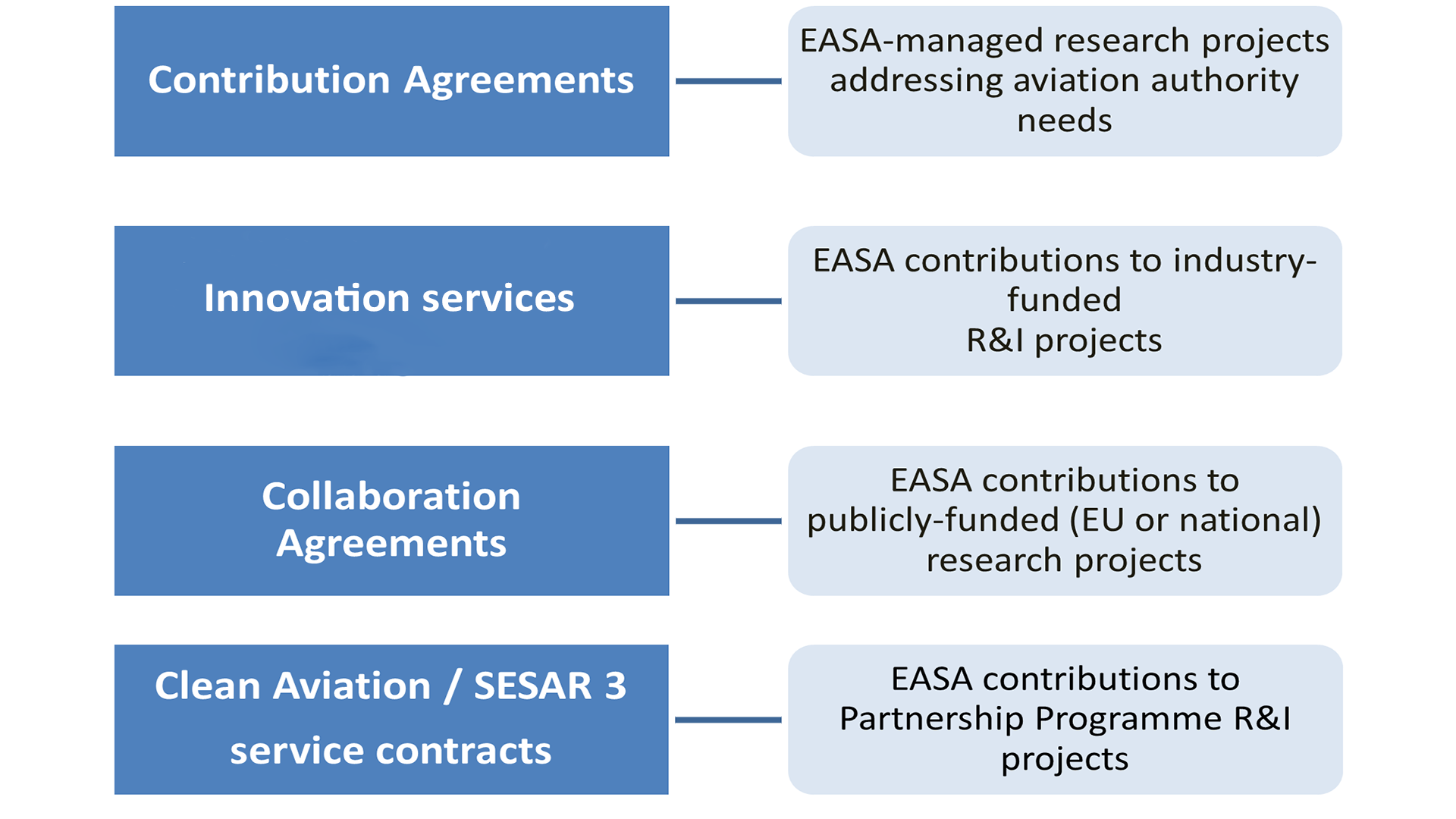The European Union Aviation Safety Agency (EASA) supports and manages Research & Innovation (R&I) initiatives in its role as regulating, certifying, approval, and oversight authority. Through the involvement in R&I, the Agency:
- develops new competences, strengthening its capacity to certify new technologies and effectively oversee innovative operations and new business models;
- participates in the latest technological development of the different aviation domains and is thus able to identify potential emerging hazards and risks;
- assists the European Commission and the Member States in identifying key research aviation themes to improve safety and environmental protection; and
- sets the ground for an agile and effective regulatory system enabling a safe and timely entry into market of new technologies and innovative systems.
The Agency engages in R&I using a variety of tools:

- Launching research projects addressing the needs of an Aviation Authority. These projects are funded by the European Union Research Programmes, such as ‘H2020’ and ‘Horizon Europe’. Through several contribution agreements with the European Commission, the Agency is entrusted with the management of a number of projects in key areas in need of research.
- Offering Innovation Services to Industry for the introduction of a disruptive technology or innovative concept (including ground and air operations), whose feasibility may need to be confirmed, and for which an adequate regulatory framework is not yet existing or not mature. Read more on the Innovation Services webpage.
- Participating in collaborative Research Projects funded by European or National Research Programmes in an advisory role (as a third party or member of the Project Advisory Board).
- Participating in Public-Private Partnership Aviation Research Programmes such as SESAR 3 and Clean Aviation Joint Undertakings. Through service contracts with the project consortium leaders, the Agency provides advice on the development of new products/systems/solutions for their future certification and for enabling new concepts of operation.
On this site, you can find the following:
- EASA R&I stakeholders
- Aviation authorities’ research agenda
- Contribution agreements
- Consult our research reports
EASA R&I stakeholders
Stakeholders’ engagement and cooperation is key in Research & Innovation (R&I). The Agency is exchanging with its Industry and Members States’ Advisory Bodies, with national Research Centers and with Academia through the EASA Scientific Committee, and has signed several Memoranda of Cooperation (MoC) with various R&I actors .
Aviation authorities’ research agenda
In 2024, the Agency actively engaged with the Member States to create a common Aviation Authorities’ Research Agenda as input for future EU Research Programmes. The proposed research topics aim to support the aviation authorities’ core activities (rulemaking, certification, approval, oversight), while preparing the Agency and Authorities’ staff for future challenges. Presently, the Aviation Authorities’ Research Agenda includes the following:
- Aviation authorities’ needs – proposed as EASA managed topics: research projects to be launched and managed by EASA if EU Research Programmes funds are allocated to EASA in the form of a contribution agreement signed with the European Commission;
- Aviation authorities’ needs – proposed as SESAR 3 JU managed topics: research projects to be launched and managed by SESAR 3 JU, with EASA supporting the projects as technical advisors
- Aviation authorities’ needs – proposals by Member States for funds from the European Commission or from funds from other Members States
-
Aviation topics – general: research priorities proposed to the European Commission for funds to be managed by executive agencies, such as the European Climate, Infrastructure and Environment Executive Agency (CINEA).
Contribution agreements
Since 2020, the European Commission and the Agency have concluded three contribution agreements on aviation safety research, entrusting the Agency with the management of several research actions identified under the European Framework Programme for Research and Innovation, notably, under the following:
- Horizon 2020 Specific Programme;
- Horizon Europe Work Programme 2021; and
- Horizon Europe 2023-2024 Work Programme.
The first Contribution Agreement (RES-CA.1), signed on 31 March 2020, addresses nine research topics with a total funding of EUR 13 million:
- effectiveness of flight time limitations (FTLs);
- vulnerability of manned aircraft to drone strikes;
- quick recovery of flight recorder data;
- cabin air quality;
- fire risks caused by portable electronic devices (PEDs) on board aircraft;
- assessment of environmental impacts — engine emissions and aircraft noise;
- helicopter off-shore operations (HOFO) — new floatation systems;
- integrity improvement of rotorcraft main gear boxes (MGBs); and
- market-based measures (Emissions Trading System (ETS) and ICAO’s Carbon Offsetting and Reduction Scheme for International Aviation (CORSIA)).
The second Contribution Agreement (RES-CA.2), signed on 25 February 2022, addresses six research topics with a total funding of EUR 14.2 million:
- response to lessons learnt from recent accidents/incidents in air transport;
- safety standards for the introduction of key concepts and technologies;
- solutions for runway safety;
- standards supporting the digital transformation of aviation;
- development of new aviation health safety standards (for flight crews); and
- impact of security measures on safety.
The third Contribution Agreement (RES-CA.3), signed on 22 March 2023, addresses seven research topics with a total funding of EUR 8.5 million:
- training media allocation — simulator vs actual flying;
- new intelligence solutions exploiting big data technologies and data science;
- evolutions of airworthiness standards for new aircraft structure designs, using materials, processes, and advanced manufacturing methods;
- aviation resilience — cybersecurity threat landscape;
- new health safety measures in aircraft;
- colour vision requirements in the new full-glass cockpit environment and modern air traffic controller (ATCO) consoles; and
- strengthening and coordinating a European network of experts in support of non-CO2 emission impact assessment and policy option assessment.
Check our ‘Research projects’ list for more details on each of the research actions managed by the Agency.
For more information on current or future tenders, please consult our ‘Calls for tender’ page .
Consult our research reports
The list of previous research and studies undertaken by the Agency can be found on our website under 'Research Reports'.